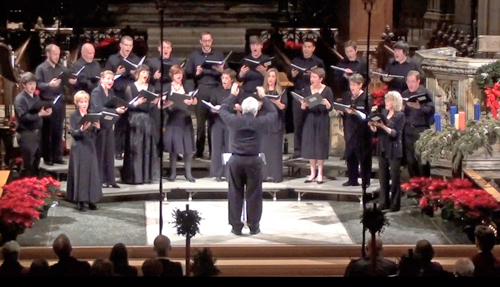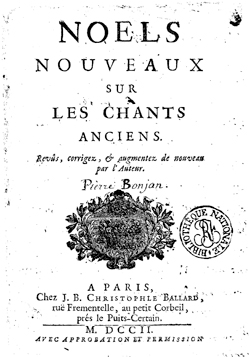by Daniel Hathaway

Literary scholars began collecting the texts of these carols as early as 1537, when Pierre Sergent gathered 150 of them into his anthology, Les Grans Noelz. By the late seventeenth century, the Noëls had inspired Parisian composers to write sets of organ variations on their delightful tunes. Marc-Antoine Charpentier based an entire setting of the midnight mass on eleven of them for use in L’Eglise Saint-Louis, the Jesuit church in the Marais district of Paris. One carol tune was even pinched by English composer John Gay for his 18th century Beggar’s Opera, where it was set to the distinctly secular text, “Fill every glass, for wine inspires us.”
Underlining the popularity of the Noëls in French culture, Duffin referred to Olivier Brault, the Montréal-based concertmaster of Apollo’s Fire. “Olivier said that he grew up with the Noëls as part of the popular culture and as a year-round thing, not just at Christmastime, though that was even more intense,” Duffin said. “A Montréal organist used to give annual recitals of Daquin Noëls at the Oratoire St. Joseph, for example. So Olivier has heard them all his life and he sometimes travels with a facsimile of the 1550 Grande Bible des Noelz, though he has many of the lyrics memorized by now.
“A few years ago, Olivier got an ensemble together to record the complete 1703 collection I mention in my program notes, the Ballard Chant des Noëls anciens et nouveaux, and he often sings a Noël at bedtime to his young son. So you can see how, if a 21st-century musician can be so enamored of the repertoire, these pieces must have permeated the lives of French people in the late 17th-century.”
Charpentier’s Messe de Minuit pour Noël will form the backbone of this weekend’s programs, interspersed with Duffin’s choral arrangements of the tunes Charpentier incorporated into his setting of the Christmas liturgy. Duffin has had fun tracking down versions of the original tunes. “It surprises me that nobody has had this idea before,” he said in a phone conversation. “Though the melodies of the carols exist in several sources, there are no choral arrangements of these pieces from the seventeenth century.”
Choosing which verses to use became another part of the puzzle. “In the century and a half between 1537 and Charpentier’s Messe, many new stanzas were added to the carols. I think people just really loved the tunes and wanted to keep singing them over and over again,” Duffin said. “But at 40 to 50 seconds per verse, some carols might last for twenty minutes — too long for our purposes.
“Some are more complicated than others musically. Laissez paître vos bêtes gets quite contrapuntal.” Does Duffin have a favorite? “That’s like asking a parent about his favorite child! But Quelle est cette odeur is already one of my favorites. Maybe once we’ve performed them, others will emerge. I also love Jean Philippe Rameau’s O Nuit! that we’re singing at the end.”
That piece, originally an air for a Priestess of Diana from the opera Hyppolyte et Aricie, was later retexted with Christmas words. “O Nuit! was featured in the 2004 film Les Choristes,” Duffin noted, “which presents choral music as a redemptive art.”
Ross Duffin has consciously planned his arrangements of the carols with Quire’s own musicians in mind. “One of the nice things about this program is the opportunity it gives to feature a lot of individual singers in solo roles and duets. It’s really remarkable that so many of our singers have solo quality voices. And I’m proud that these are people who live in Cleveland. The profile of our group is to feature artists who have made Cleveland their home.” That also goes for the ensemble of baroque instruments — a string quartet, flute and recorders, theorbo and harpsichord — that Duffin will use to accompany the Charpentier mass movements. All but two of the instrumentalists are Cleveland area residents.
The 90-minute program will be presented three times: on Friday, December 19 at Trinity Cathedral in Cleveland, on Saturday, December 20 at Mary Queen of Peace Church in Old Brooklyn (both at 7:30 pm), and on Sunday, December 21 at Historic St. Peter’s Church in Cleveland at 4:00 pm.
Published on ClevelandClassical.com December 16, 2014.
Click here for a printable copy of this article



